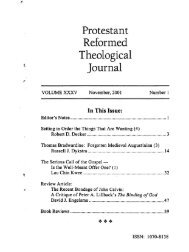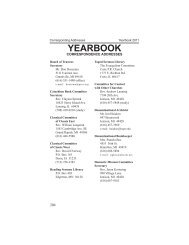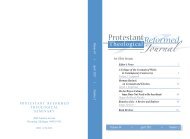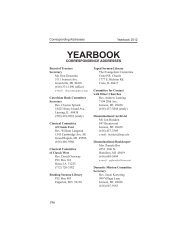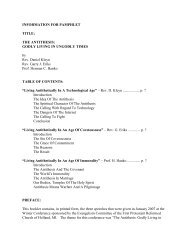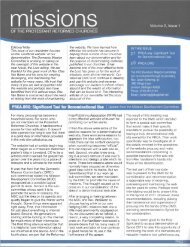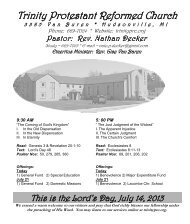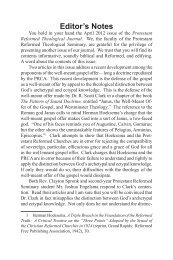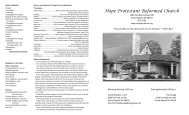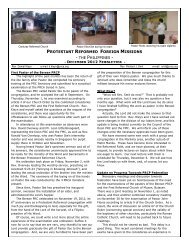November 2007 - Protestant Reformed Churches in America
November 2007 - Protestant Reformed Churches in America
November 2007 - Protestant Reformed Churches in America
Create successful ePaper yourself
Turn your PDF publications into a flip-book with our unique Google optimized e-Paper software.
<strong>Protestant</strong> <strong>Reformed</strong> Theological Journal<br />
Peter Lillback, <strong>in</strong> a detailed treatment of Calv<strong>in</strong>’s conception<br />
of the covenant, notes that he also uses the words “oracles,” “way,”<br />
and “fellowship” as synonyms for the covenant. 5 In connection<br />
with the last of these terms (“fellowship”), Lillback rightly quotes<br />
the first three sentences of that section of the Institutes (book 2,<br />
chapters 10 and 11) <strong>in</strong> which Calv<strong>in</strong> most fully treats the covenant:<br />
Now we can clearly see from what has already been said that all men<br />
adopted by God <strong>in</strong>to the company of his people s<strong>in</strong>ce the beg<strong>in</strong>n<strong>in</strong>g<br />
of the world were covenanted to him by the same law and by the<br />
bond of the same doctr<strong>in</strong>e as obta<strong>in</strong>s among us. It is very important<br />
to make this po<strong>in</strong>t. Accord<strong>in</strong>gly I shall add, by way of appendix, how<br />
far the condition of the patriarchs <strong>in</strong> this fellowship differed from<br />
ours, even though they participated <strong>in</strong> the same <strong>in</strong>heritance and hoped<br />
for a common salvation with us by the grace of the same Mediator<br />
(2.10.1, pp. 428-429).<br />
After further references to the “Mediator,” “<strong>in</strong>heritance,”<br />
“grace,” “mercy” and “peace,” etc., of God’s “spiritual” covenant<br />
<strong>in</strong> Calv<strong>in</strong>’s writ<strong>in</strong>gs, Lillback concludes,<br />
... the essence of Calv<strong>in</strong>’s conception of the covenant is the notion of<br />
Moshe We<strong>in</strong>feld, “berith,” Theological Dictionary of the Old Testament,<br />
vol. 2, eds. G. Johannes Botterweck and Helmer R<strong>in</strong>ggren, trans. John T.<br />
Willis [Grand Rapids: Eerdmans, 1975], pp. 253-255; Gottfried Quell,<br />
“diatheke,” Theological Dictionary of the New Testament, vol. 2, ed.<br />
Gerhard Kittel, trans. Geoffrey W. Bromiley [Grand Rapids: Eerdmans,<br />
1964], pp. 107-108; Johannes Behm, “diatheke,” Ibid., p. 134). The biblical<br />
lexicons of Calv<strong>in</strong>’s day also let him down, when he mistakenly<br />
stated <strong>in</strong> his Institutes, “the word ‘baptize’ [baptize<strong>in</strong>] means to immerse”<br />
(4.15.19, p. 1320). See the thorough treatment of the Greek word<br />
baptize<strong>in</strong> <strong>in</strong> James W. Dale’s four volumes: Classic Baptism, Judaic<br />
Baptism, Johannic Baptism, and Christic Baptism and Patristic Baptism.<br />
5. Peter A. Lillback, The B<strong>in</strong>d<strong>in</strong>g of God: Calv<strong>in</strong>’s Role <strong>in</strong> the Development<br />
of Covenant Theology (Baker: Grand Rapids, 2001), p. 134,<br />
n. 30.<br />
30<br />
Vol. 41, No. 1



